Imagine a nightmarish future in which the essentials of life are ruthlessly supplied to all—one where each citizen is brutally denied the cliffhanging entertainment of recurrent life-and-death crises, and where there is not even a single genetically engineered hyper-intelligent carnivorous flightless parrot roaming daycare facilities. Benevolent providence has so far protected us from such hellishly stable futures, but it cannot prevent authors from imagining them. But once such utopias are imagined, how is the poor author to squeeze an interesting story out of a world lacking everything that makes life precious (as well as precarious)?
I previously reviewed a series in which this challenge was successfully met and found myself wondering how other authors have handled the problem. Here are a few such works—doubtless there are more, which readers may feel free to suggest in comments.
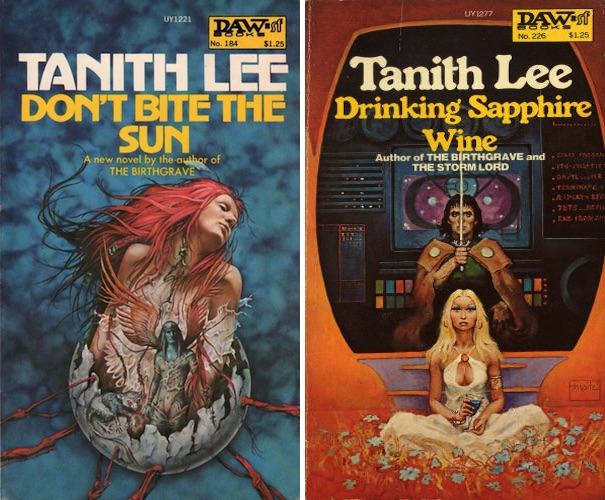
Tanith Lee’s classic duology Don’t Bite the Sun and Drinking Sapphire Wine is set on a desert world hostile to unprotected life. Not that this matters, because all of its human inhabitants live in one of three domed cities: Four BEE, Four BAA, and Four BOO. Within those cities, virtually every need and desire is met. Even death is only a momentary inconvenience before one is incarnated in a new designer body.
The nameless protagonist, offered material paradise, commits the unforgivable sin of realizing that while the options offered are pleasant, none of them are meaningful. That realization is the border between life in paradise and life in a cossetted hell. Unfortunately for our hero, the Powers That Be in the three cities are determined to maintain the status quo of their cozy societies, keeping them just as they are…which means crushing (by any means necessary) any pesky aspirations for personal fulfillment.
***
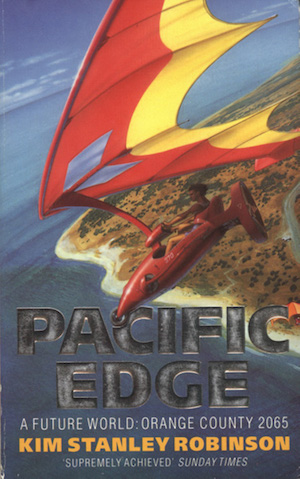
Pacific Edge is that rara avis, a Kim Stanley Robinson book about which I will make favourable comments. Set in a utopian world in which the excesses of capitalism and environmental degradation have been brought to heel, it’s a setting in which most people can expect to enjoy perfectly acceptable middle-class lives of placid ambitions and ecological moderation. Aside from people with burning desires to build strip malls or dark satanic mills, Pacific Edge’s world seems one where it would be easy to be happy.
Except, of course, if one is an essentially unlovable prig like the novel’s lead, Kevin Claiborne, whose steadfast adherence to the ethic that makes his world the quasi-utopia that it is does not make him one iota more desirable to Ramona, the woman with whom he is smitten. Convinced that he is in a romantic triangle, Kevin contends mightily against the man he sees as his rival. It’s a romance with a happy ending, although not for Kevin.
***
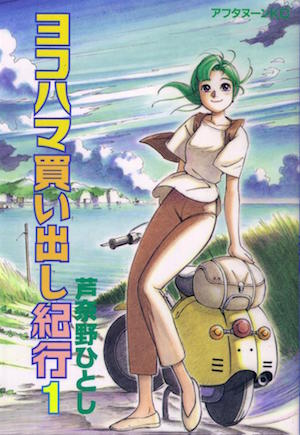
Hitoshi Ashinano’s Yokohama Kaidashi Kikō is set not long after the end. Events never fully explained led to rising sea levels and the inexorable decline of the human species. Despite this, the era in which protagonist Alpha lives seems to be a tranquil one, in which one day is much like another. It helps that Alpha is not a human, but rather one of the immortal androids who will inherit the Earth once we’re gone.
Nothing much happens in YKK, and what does, happens slowly. The series eschews drama for depictions of life’s quiet moments, moments of melancholy (for the humans, who to be honest do not seem all that bothered by their coming extinction), shared happiness, and (of course) lavish scenery porn. Which gets us to…
***
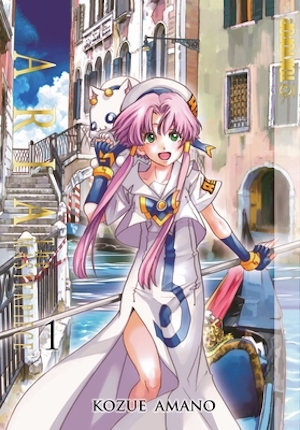
Amano Kozue’s Aria is set on 24th-century Mars. Implausibly effective terraforming has turned the dead world we know into an ocean-covered garden world now called Aqua, one across which energetic humans have sprinkled works of impressive civil engineering. One of its jewels is the city of Neo-Venezia, which is as close to a one-to-one scale model of Venice as its architects were able to create. It seems likely that the process of transforming Mars involved many dramatic moments, but all of that is in the past. Modern Aqua cares not for plot-enabling drama.
Instead, the manga follows Akari and her friends as they struggle to master the skills needed to join the upper ranks of Aqua’s Undines (or gondoliers). All that stands between the teenaged girls and the positions they desire is years of hard work. This slice of life futuristic tale is, like YKK, about the quiet moments in life, illustrated by lavish scenery porn: Come to Mars for the gondolas, stay for the exquisite submerged ruins.
***
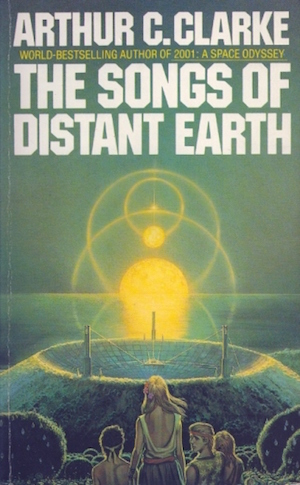
Terrestrial humanity is entirely extinct in Arthur C. Clarke’s The Songs of Distant Earth. No doubt awareness of the Sun’s impending nova provoked all manner of drama on Earth. For the people of the exoplanet Thalassa, settled centuries before by a sub-light seedship, the nova is barely a historical footnote. Ocean-covered Thalassa offers its island-dwelling population of decent, sensible people satisfactory small lives punctuated only by small-scale, non-threatening interesting events.
This tranquil existence is disrupted by the sudden arrival of Magellan, the last starship from now-expunged Earth. Forced by mishap to pause briefly at the backwater world, the crew of Magellan appeal to Thalassa to allow them to orbit and rebuild their debris shield from Thalassa’s abundant water. “Briefly” is still enough time for the Thalassan woman Mirissa to notice just how attractive strangers can be (in a world that’s normally entirely lacking in strangers). As the ensuing romance and its repercussions unspool, the Magellan’s crew must decide whether to continue to their intended destination or to stay at Thalassa.
***
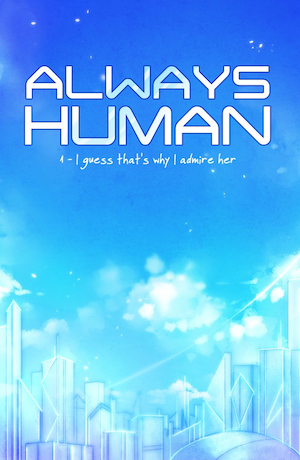
Mods (body modifications) grant the characters that populate walkingnorth’s webcomic Always Human nigh-perfect health and virtually any appearance they desire. These beautiful folks live in a peaceful world filled with ample opportunities for rewarding work. Mods and other high technology also facilitate humanity’s inexorable spread across the Solar System (even if the mods are not yet as powerful as John Varley’s null-suits, as featured in his Eight Worlds books).
When VR designer Sunati encounters university student Austen while riding the lavishly funded public transit, Sunati is intrigued by Austen’s bold decision to not use mods. In fact, Austen has a disability that prevents her from using mods; the excruciating conversation provoked by Sunati’s misapprehension is the meet-cute that kicks off the romance that forms the central plot line of the webtoon. Along the way, walkingnorth illustrates all the challenges that even people in quasi-utopian worlds will inevitably face, from crippling self-doubt to impossible work-life balance challenges. There are moments of gentle drama—true love does not always run smooth—but in the end, all is love and kisses.
***
All those are from recent reading. What about you?
Originally published in September 2018.
In the words of Wikipedia editor TexasAndroid, prolific book reviewer and perennial Darwin Award nominee James Davis Nicoll is of “questionable notability.” His work has appeared in Publishers Weekly and Romantic Times as well as on his own websites, James Nicoll Reviews and Young People Read Old SFF (where he is assisted by editor Karen Lofstrom and web person Adrienne L. Travis). He is surprisingly flammable.










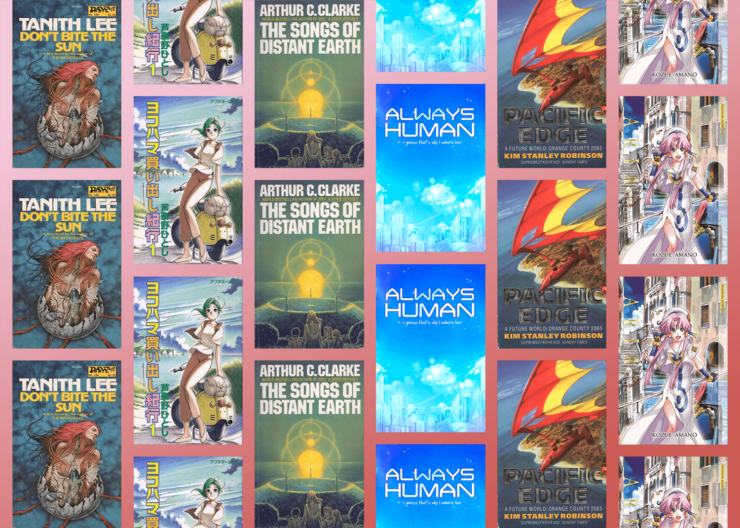
I would really, really, really like to (legally) read YKK (in English). For one thing, it would be a balm after reading Girls’ Last Tour…
Would Aria make sense as the future tense of Carole and Tuesday?
I don’t think Aria makes sense as Carole and Tuesday’s future, no. No massive ongoing terraforming and C&T’s technical assumptions seem rather conservative. At least, the one volume I read could have been set in 2020.
Though the anime expression of C&T has AI cheap enough to be near-ubiquitous, and strong enough that it’s put human songwriters out of business.
I feel like the elephant in the room is Iain M Banks’ Culture books. Finding drama in Utopia is basically their raison d’etre
Banks generally wrote near the Culture rather than in it.
My favourite Utopia-based fiction is not a novel but a shorter piece – Orson Scott Card’s “Unaccompanied Sonata”. It just, um, struck a chord (sorry not sorry)
Anybody else walk away from Omelas?
Julian M. Mays’ excellent Saga of the Pliocene Exile series, and its prequel The Galactic Milieu series, started off with the idea of misfits escaping a utopian society via a one-way time portal to 6-million-years-ago Earth. Really recommend this series if you’ve never read it!
Would you consider Voyage From Yesteryear Utopian? It’s post-scarcity but hardly without drama in the world even before the starships from Earth arrive.
So… of these six “utopias”, two are kind of dystopic, two are post-apocalyptic, three have drama only because humans are still bad at relationships even in paradise, and two have, in fact, basically no drama?
@7: Yes, that one!
And The Dispossessed, which digs into the human meanness of an anarchist utopia (which is nevertheless light years better than the culture its founders fled).
And Always Coming Home. YouTube reviewer Kalanadi describes it as a “soft dystopia,” but I think that slightly misses the mark. In the Kesh, Le Guin describes one of the best possible outcomes of unrestrained metastasis of the cultural ills of the 1980s, most of which are also ours, save the looming threat of nuclear war. It is simultaneously the greatest good for the greatest number and a life scratched out of a wrecked, poisoned wasteland, and the historically minded among the Kesh know this. And the personal narratives woven throughout the book contain plenty of drama.
I think Down and Out in the Magical Kingdom by Cory Doctorow also qualifies as a dramatic utopia. It’s set in a post scarcity society in Disney world? land? (I’m not American I’m not sure which one is which) between different groups competing to have the best ride. The best compromise between maintaining and respecting history and updating the rides to be relevant to modern park goers.
Perhaps I’m missing something but Ian Bank’s Culture series?
I wonder if Becky Chambers ‘ Psalm for the Wild-Built will fit this trope. Certainly parts of her Wayfarers series are utopian societies.
I loved Always Human! A brightly-coloured, fascinating world – and with subtle, sophisticated, totally believable character dynamics underneath. I’ve been meaning to order the physical volume for rereads.
RE :THE SONGS OF DISTANT EARTH,
Clarke’s IMPERIAL EARTH is another example of drama in a Utopian setting. The solar system in 2276 is a very pleasant place (no poverty, no racism, etc), but romantic triangles and personal ambition are still around.
Thanks for the link to Always Human. What a lovely, sweet story.
I was thinking Larry Niven’s short story “Safe at Any Speed” would qualify.
I just got my copy of Don’t Bite the Sun, and it’s the original first edition too! I can’t wait to get into it.
I love Always Human, I should do a reread.
M.C.A. Hogarth’s peltedverse is more or less utopian (or MUCH less) depending on where in it the characters happen to be, but in the Mindhealers series (Mindtouch, Mindline, Dreamhearth, Dreamstorm) the characters spend most of their time in a perfectly nice part of it where the problems they most often have to deal with are standard new adult woes. Passing your university courses, figuring out what you want to do with your life, starting a career, getting established in a new town, work life balance, mental health. All familiar ordinary struggles that just happen to be set in a world with starships and genetically engineered animal people.
Story set in a Utopian future? Go back to the beginning. Heinlein (of course) in his first published novel : Beyond this Horizon.
My copy of Drinking Sapphire Wine has the same cover shown in your article. I love her work, but particularly this book. Lee was a big shock to the suburban kid I was.
The protagonist’s realization that “the options offered are pleasant, [but]none of them are meaningful” reminds me of a character in The Gate to Women’s Country, who realized that, although his prowess at sport brought him recognition and status, as well as pleasure, it changed nothing.
Pacific Edge is the third of KSR’s Three Californias trilogy. The others aren’t utopias, but the trilogy benefits from reading all of it because they complement each other, so it should have been mentioned. The first volume, The Wild Shore, was also the first volume in the third series of Ace Science Fiction Specials, which is when I originally read it. (I read all of Terry Carr-edited series 1 and 3 as they were released.) Three Californias remains after all of these years my favorite KSRs, meaning that I’ve liked some of his other books (the Mars trilogy, Aurora) and disliked others of his books (The Years of Rice and Salt, 2312) but even the failures are notable for their ambition. It’s just that sometimes his characters are less interesting than he thinks they are, which was a big issue with 2312, but very much not an issue with Aurora.
Want an intense future utopia that has its hidden dramas that bubble under the surface? Fantastic characterization? Historical and philosophical references? Pick up Too Like the Lightning by Ada Palmer. Yes, there are sequels–it’s the first in the Terra Ignota series.
Past Master, by R. A. Lafferty, is set in a future Utopia.
As viewed by the author of the original Utopia.
A time traveling Sir Thomas More.